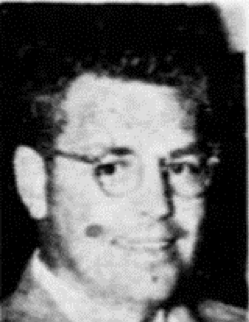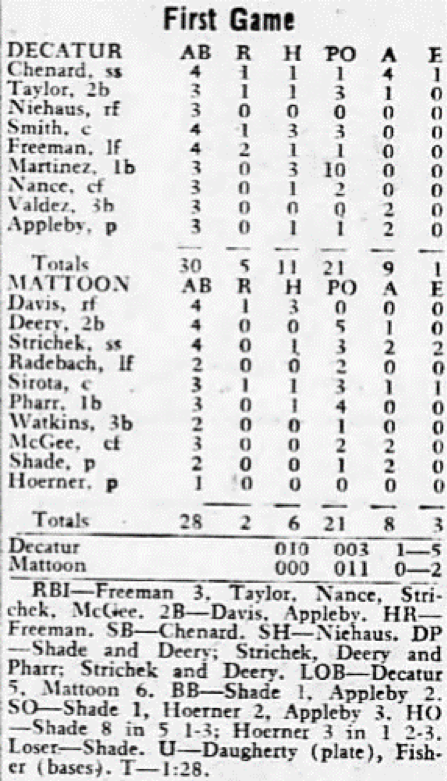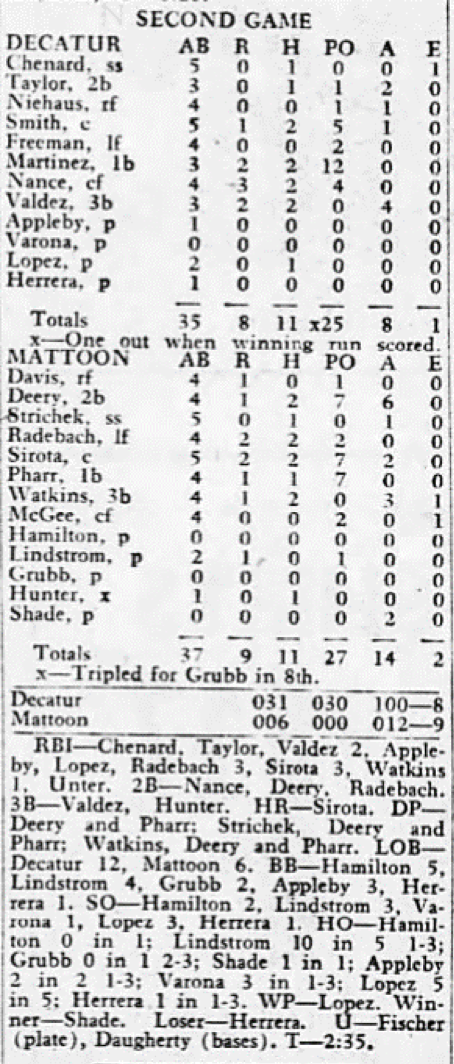July 22, 1953: Bob Appleby’s ironman attempt fails as Decatur and Mattoon split doubleheader
 On July 22, 1953, the Mattoon (Illinois) Phillies and Decatur (Illinois) Commodores of the Class D Mississippi-Ohio Valley League played a doubleheader at Mattoon Baseball Park.1 These were the second and third games in a five-game series between league-leading Decatur, known in the local media as the Commies, and third-place (6½ games out) Mattoon.2 The previous night Decatur had won the first game of the series, 6-2, breaking Mattoon’s five-game winning streak.
On July 22, 1953, the Mattoon (Illinois) Phillies and Decatur (Illinois) Commodores of the Class D Mississippi-Ohio Valley League played a doubleheader at Mattoon Baseball Park.1 These were the second and third games in a five-game series between league-leading Decatur, known in the local media as the Commies, and third-place (6½ games out) Mattoon.2 The previous night Decatur had won the first game of the series, 6-2, breaking Mattoon’s five-game winning streak.
The Commodores were defending Mississippi-Ohio Valley League champions, winning the 1952 title with a ground-breaking roster that included the first Black professional players in Decatur history – Jim Freeman, Pete Naranjo, and Carlos Paula – and several players hailing from Cuba.3
The 1,140 spectators were treated to a pregame dispute over game-length, an “ironman” attempt, attendance prizes, a performance between games by baseball comedian Jackie Price, and a late night, improbable, but happy, ending for the home team.
Why would there be a dispute about the length of a game? The doubleheader was a result of a rainout of the second game of the previous night’s doubleheader. So even though the league rules called for seven-inning games in the case of a twin bill, Mattoon treated the first game, which started at 7:15 P.M., as the makeup game of the doubleheader (and so a seven-inning game) and the second game as the regularly scheduled nine-inning game. Asked about this, the Mattoon business manager, Willis “Tiny” Chapman,4 was quoted as saying, “Others are violating it, why shouldn’t we?”5 (These were not the only rules Chapman violated; after the 1953 season, he pleaded guilty to embezzling $2,517.45 of Mattoon baseball funds.6)
The starting pitcher for Decatur in the first game was Bob Appleby, a 30-year-old lefty making his third appearance in nine days. He had a complete-game victory for the Commodores against the Mississippi-Ohio Valley All-Stars on July 14.7 He followed that up with a scoreless four-inning relief appearance three days later. Mattoon countered with Louis “Mike” Shade, a 21-year-old right-hander.
Decatur scored in the second when left fielder Freeman reached on an error and was driven in by a single by center fielder Creed Nance. Mattoon tied the game in the bottom of the fifth. Right fielder Jim Davis singled – his third straight hit in the game – advanced on a grounder by second baseman-manager Jim Deery, and scored on shortstop Don Strichek’s single.
The Commodores broke the game open in the top of the sixth, when with two on and one out Freeman hit a home run over the right-center-field wall, scoring second baseman-manager Ray Taylor and catcher Andy Smith ahead of him for a 4-1 lead. Mattoon brought in right-hander Nelson Hoerner to relieve Slade, and Hoerner got the next two outs with no further damage.
Mattoon got a run back in its half of the sixth inning when catcher Alex Sirota singled to open the inning, moved to third on first baseman Earnest “Gene” Pharr’s single off pitcher Appleby’s glove, and scored on center fielder Bob McGee’s fly ball. But that was the last run Appleby gave up. Decatur scored an insurance run in the seventh when Taylor singled to score shortstop Gonzalo “Gus” Chenard, making it 5-2, which was the final score.
Appleby was the winning pitcher, giving up six hits and two walks while striking out three. Shade was the losing pitcher for Mattoon. The game took 1 hour and 28 minutes.
Between the games Jackie Price performed. Price was a baseball clown, like Al Schacht and Max Patkin, who was in the middle of a Midwest tour. In promoting Price’s scheduled appearance in Decatur on July 28, the Decatur papers, besides calling him “the greatest artist in the country with ball, bat and glove,” noted that he had performed the night before in Peoria, Illinois, and that he was driving from Mattoon to Decatur (separated by about 46 miles) via Kalamazoo, Michigan; Sioux City, Iowa; Evansville, Illinois; and Union City and Paducah, Kentucky.8
Including his start against the Mississippi-Ohio Valley All-Stars, Appleby had thrown 20 innings in nine days, but Decatur sent him back to the mound in the second game of the doubleheader. As when Appleby faced the all-stars, the opposing starter was Mattoon’s Dennis “Pete” Hamilton, a 19-year-old right-handed curveballer.
The first inning was scoreless, but Decatur took a 3-0 lead in the top of the second. Hamilton walked the first three batters to load the bases, then threw four more balls to ninth-place hitter Appleby to force in a run. Mattoon manager Deery brought in Andrew Lindstrom to relieve Hamilton. Lindstrom induced Chenard to ground into a double play as Nance scored the second run of the inning. The third run scored on Taylor’s infield single, plating third baseman Manuel Valdez.
Decatur increased the lead to 4-0 in the top of the third when Smith singled to lead off and eventually scored from third on an error by Mattoon third baseman Al Watkins.
In the bottom of the third Mattoon rallied against Appleby. He got the first batter, but then walked three straight batters, Lindstrom, Davis, and Deery.
That was all for Appleby. Manager Taylor brought in Mario Varona, a 27-year-old former outfielder-first baseman who, after a three-year hiatus from professional baseball, was now trying to make it as a pitcher. Strichek struck out, but Varona gave up a bases-clearing double to left fielder Marshall “Buster” Radebach. Sirota followed with a single, scoring Radebach with the tying run.
After first baseman Pharr singled, Decatur brought in its third pitcher of the inning, Alfonzo Lopez. Watkins singled the fifth run home with Sirota going to third. Sirota scored the sixth and final run of the inning on a wild pitch by Lopez, putting Mattoon ahead, 6-4.
Mattoon’s lead lasted until Decatur rallied in the top of the fifth. First baseman Sergio “Marty” Martinez and Nance singled, and Valdez brought them both home with a triple to right. Lopez followed with an RBI single, making the score 7-6, Decatur.
Decatur added a run in the seventh when Nance, who had doubled, came home on Chenard’s single. Right-hander Jim Grubb relieved Lindstrom and got out of the inning with no more runs scoring. The seventh inning ended with Decatur ahead 8-6 – which meant that if the league rule about doubleheaders being two seven-inning games had been followed, Mattoon would have lost its third straight. But there were still two innings to play, and Mattoon made the most of them.
In the bottom of the eighth, Mattoon made it 8-7 when Robert “Sam” Hunter, pinch-hitting for Grubb, tripled Watkins home from first. In the top of the ninth, Mattoon manager Deery brought in Shade, the starter (and loser) in the first game, who kept it a one-run game.
In the bottom of the ninth, Decatur manager Taylor brought in 19-year-old left-hander Luis Herrera, whose 213 innings pitched in 1953 led the Commodores’ staff. With one out, Herrera walked Radebach. Then catcher Sirota sent a drive against the center field wall, 360 feet away. When center fielder Nance had trouble retrieving the ball, Sirota rounded the bases and beat Chenard’s relay throw to the plate for a walk-off inside-the-park home run.
With the comeback Slade became the winning pitcher, making his record for the day 1-1. Herrera absorbed the loss for Decatur. The game was played in 2 hours and 35 minutes. The split left Mattoon in third place, 6½ games behind Decatur.
On the surface it seemed like a questionable move for Decatur to try an ironman performance and start Appleby in the second game. After 22 innings in nine days, he had lost his control in the third inning, setting up Mattoon’s rally and its eventual comeback win.
But there is more to the story. After spending 1947 in the minor leagues, Appleby had embarked on a career coaching high-school and college football and baseball, spending the previous two years at James Milliken University in Decatur. He resigned from Milliken in March 1953 and returned to professional baseball with the Commies.
On the day of the doubleheader, however, it was announced that he was becoming the varsity baseball coach and freshman football coach for the University of Toledo effective in early August. 9 So what Decatur was most likely doing was trying to get the most out of a pitcher they knew would be leaving soon, to save their other pitchers for the end of the season. As it turned out, three Decatur pitchers – Herrera, Juan Garcia, and Guillermo Grajeda – threw 170 or more innings in 1953, while only one other member of the staff threw as many as 102. Combined, the trio accounted for 47 of Decatur’s 68 wins in the regular season.
After this game Appleby made two ineffectual relief appearances, one of which was in the fifth game of this same Mattoon series, before assuming his new position in August. His roster spot was taken by Paula,10 who had returned after starting the season with the Paris (Texas) Indians of the Class B Big State League. Paula again played on a championship team in Decatur, as the Commodores won the 1953 regular-season title by 2½ games over Paris, then defeated the Lakers in the championship series. He continued to make history in 1954, when he became the Washington Senators’ first Black player.
Author’s Note
The author was inspired to write about this game from his wife’s memories of attending Mississippi-Ohio Valley League games in her hometown of Mattoon, Illinois, in 1953. She sat behind home plate with her father and remembered watching Hamilton and Sirota as Mattoon’s battery.
Acknowledgments
This article was fact-checked by Kevin Larkin and copy-edited by Len Levin.
Sources
In addition to the sources cited in the Notes, the author consulted Baseball-Reference.com and Retrosheet.org. The game account was compiled from the July 23, 1953, editions of the Decatur Herald, Decatur Daily Review, Effingham Daily News, and Mattoon Journal-Gazette.
Photo credit: “Appleby Steps Out as Milligan Football Coach,” Bloomington (Illinois) Pantagraph, March 8, 1953: 15.
Notes
1 The Mississippi-Ohio Valley League operated from 1949 through 1955 as a Class D minor league, which at the time was the lowest classification in Organized Baseball. In 1956 the league was renamed the Midwest League, which remained a part of the minor leagues as of 2023.
2 The Paris (Illinois} Lakers were in second place, four games out.
3 Stephen Chicoine, “One Glorious Season: How Baseball Helped to Integrate Decatur, Illinois,” Journal of the Illinois State Historical Society, Vol. 96, No. 1 (2003), 80-94, http://www.idaillinois.org/digital/collection/eiu02/id/9110.
4 Chapman weighed more than 300 pounds.
5 Howard V. Millard, “11th Annual Decatur Night at Fans Field,” Decatur Daily Review, July 23, 1953: 12.
6 “Chapman Gets Probation; Must Pay Baseball Club,” Mattoon Daily Journal-Gazette, January 5, 1954: 1.
7 Appleby and the Commodores, as 1952 Mississippi-Ohio Valley League champions, had hosted a team of all-stars from the other five clubs. The Commodores won the game, 5-2. Howard V. Millard, “Commies, Appleby Whip All-Stars 5-2,” Decatur Daily Review, July 15, 1953: 14.
8 Jackie Price to Be in Mattoon Tuesday,” Decatur Herald, July 20, 1953: 7; Howard V. Millard, “Bait for Bugs,” Decatur Daily Review, July 23, 1953: 12.
9 Appleby Gets Toledo U Post,” Decatur Daily Review, July 23, 1953: 12; “Robert William Appleby: July 20, 1922-July 11, 2006,” accessed February 7, 2023, https://obituaries.normantranscript.com/obituary/robert-appleby-744914352.
10 Forrest B. Kyle, “Once Over Lightly,” Decatur Herald, August 5, 1953: 13.
Additional Stats
Decatur Commodores 5
Mattoon Phillies 2
Mattoon Phillies 9
Decatur Commodores 8
Mattoon Baseball Park
Mattoon, IL
Corrections? Additions?
If you can help us improve this game story, contact us.



